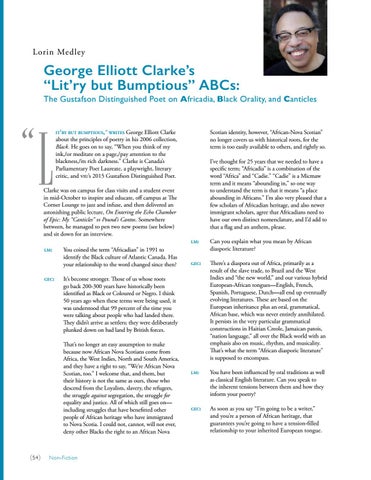Lorin Medley
George Elliott Clarke’s “Lit’ry but Bumptious” ABCs:
The Gustafson Distinguished Poet on Africadia, Black Orality, and Canticles
“
George Elliott Clarke about the principles of poetry in his 2006 collection, Black. He goes on to say, “When you think of my ink,/or meditate on a page,/pay attention to the blackness,/its rich darkness.” Clarke is Canada’s Parliamentary Poet Laureate, a playwright, literary critic, and viu’s 2015 Gustafson Distinguished Poet. Clarke was on campus for class visits and a student event in mid-October to inspire and educate, off campus at The Corner Lounge to jazz and infuse, and then delivered an astonishing public lecture, On Entering the Echo Chamber of Epic: My “Canticles” vs Pound’s Cantos. Somewhere between, he managed to pen two new poems (see below) and sit down for an interview.
L lm:
gec:
54
it'ry but bumptious,” writes
You coined the term “Africadian” in 1991 to identify the Black culture of Atlantic Canada. Has your relationship to the word changed since then? It’s become stronger. Those of us whose roots go back 200-300 years have historically been identified as Black or Coloured or Negro. I think 50 years ago when these terms were being used, it was understood that 99 percent of the time you were talking about people who had landed there. They didn’t arrive as settlers; they were deliberately plunked down on bad land by British forces. That’s no longer an easy assumption to make because now African Nova Scotians come from Africa, the West Indies, North and South America, and they have a right to say, “We’re African Nova Scotian, too.” I welcome that, and them, but their history is not the same as ours, those who descend from the Loyalists, slavery, the refugees, the struggle against segregation, the struggle for equality and justice. All of which still goes on— including struggles that have benefitted other people of African heritage who have immigrated to Nova Scotia. I could not, cannot, will not ever, deny other Blacks the right to an African Nova
Non-Fiction
Scotian identity, however, “African-Nova Scotian” no longer covers us with historical roots, for the term is too easily available to others, and rightly so. I’ve thought for 25 years that we needed to have a specific term; “Africadia” is a combination of the word “Africa” and “Cadie.” “Cadie” is a Micmaw term and it means “abounding in,” so one way to understand the term is that it means “a place abounding in Africans.” I’m also very pleased that a few scholars of Africadian heritage, and also newer immigrant scholars, agree that Africadians need to have our own distinct nomenclature, and I’d add to that a flag and an anthem, please. lm:
Can you explain what you mean by African diasporic literature?
gec:
There’s a diaspora out of Africa, primarily as a result of the slave trade, to Brazil and the West Indies and “the new world,” and our various hybrid European-African tongues—English, French, Spanish, Portuguese, Dutch—all end up eventually evolving literatures. These are based on the European inheritance plus an oral, grammatical, African base, which was never entirely annihilated. It persists in the very particular grammatical constructions in Haitian Creole, Jamaican patois, “nation language,” all over the Black world with an emphasis also on music, rhythm, and musicality. That’s what the term “African diasporic literature” is supposed to encompass.
lm:
You have been influenced by oral traditions as well as classical English literature. Can you speak to the inherent tensions between them and how they inform your poetry?
gec:
As soon as you say “I’m going to be a writer,” and you’re a person of African heritage, that guarantees you’re going to have a tension-filled relationship to your inherited European tongue.
